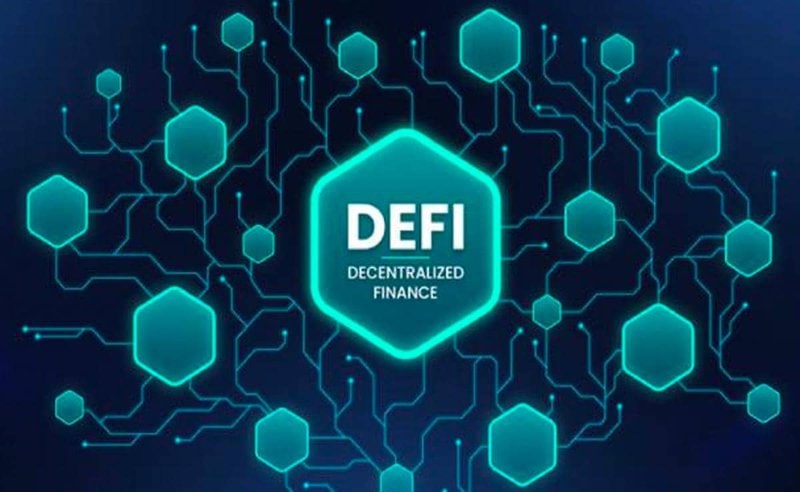What Is Decentralized Finance (Defi): Revolutionizing The Financial Landscape

Decentralized Finance (DeFi) is a rapidly emerging concept that has the potential to revolutionize the financial landscape. Built on the foundation of blockchain technology, DeFi aims to create an open, transparent, and accessible financial system that operates without the need for intermediaries such as banks or financial institutions.
This article provides an in-depth exploration of DeFi, starting with an understanding of blockchain technology and its role in enabling decentralized applications (dApps). It delves into the concept of smart contracts, which are self-executing contracts with the terms of the agreement directly written into code.
Furthermore, the article examines the various aspects of DeFi, including lending and borrowing platforms, as well as trading and investing opportunities. The potential impacts of DeFi on the global financial ecosystem are also analyzed, along with the regulatory challenges it may face.
Ultimately, this article aims to provide a comprehensive overview of DeFi and its potential to transform traditional financial systems.
Key Takeaways
- DeFi aims to revolutionize the financial landscape by creating an open and transparent system without intermediaries.
- Smart contracts are self-executing contracts with terms written into code, providing transparency and efficiency in DeFi.
- dApps in DeFi offer a decentralized and transparent financial ecosystem, promoting financial inclusivity and empowering individuals to have control over their finances.
- DeFi platforms democratize access to financial services by eliminating intermediaries, reducing costs, and providing a secure and transparent environment for financial transactions.
Understanding Blockchain Technology
Blockchain technology is a decentralized and transparent ledger system that enables secure and immutable transactions, revolutionizing various industries including finance.
It operates on a distributed network of computers, known as nodes, which collectively maintain a shared database of transactions.
The blockchain ensures that all participants have access to the same information and that no single entity has control over the entire network.
This decentralized nature eliminates the need for intermediaries, such as banks or clearinghouses, reducing costs and increasing efficiency.
Through the use of cryptographic algorithms, blockchain technology ensures the integrity and immutability of data, making it highly secure against tampering or fraud.
Additionally, the transparency of the blockchain allows for increased trust and accountability in financial transactions, as all participants can verify the authenticity and accuracy of the recorded data.
Exploring Smart Contracts
This paragraph discusses the key points of how smart contracts work and the advantages of smart contracts in decentralized finance (DeFi).
Smart contracts are self-executing contracts with the terms of the agreement directly written into lines of code. They work by automatically executing the terms of the agreement once certain conditions are met.
In DeFi, smart contracts provide transparency, security, and efficiency by eliminating the need for intermediaries and enabling trustless transactions.
How Smart Contracts Work
Utilizing a digital code-based mechanism, smart contracts serve as self-executing agreements that facilitate secure and transparent transactions within the decentralized finance ecosystem. These contracts are built on blockchain technology, enabling them to operate in a decentralized manner, without the need for intermediaries or third parties.
Here is a breakdown of how smart contracts work:
- Creation: Smart contracts are created by developers using programming languages specifically designed for this purpose, such as Solidity for Ethereum.
- Deployment: Once created, smart contracts are deployed onto the blockchain, where they become immutable and publicly accessible.
- Triggering Events: Smart contracts are triggered by specific events or conditions, such as a certain date or the fulfillment of certain pre-agreed conditions.
- Automated Execution: When triggered, smart contracts automatically execute the predetermined actions, such as transferring funds or updating records, without the need for manual intervention.
By operating on a trustless and decentralized infrastructure, smart contracts eliminate the need for intermediaries, reduce transaction costs, and enhance transparency and security in financial transactions.
Advantages of Smart Contracts in DeFi
One of the key advantages of smart contracts is their ability to streamline and automate complex financial processes, enhancing efficiency and reducing the potential for human error. By eliminating the need for intermediaries and third parties, smart contracts in decentralized finance (DeFi) enable direct peer-to-peer interactions, thereby reducing transaction costs and increasing transparency. Additionally, smart contracts are immutable, meaning once they are deployed on the blockchain, they cannot be altered, providing a high level of security and trust. Furthermore, smart contracts in DeFi allow for programmable money, where predefined conditions can be set and executed automatically. This enables the creation of innovative financial products and services, such as decentralized lending and borrowing platforms, decentralized exchanges, and automated investment strategies. Overall, the advantages of smart contracts in DeFi lay the foundation for a more efficient and inclusive financial ecosystem.
| Advantages of Smart Contracts in DeFi |
|---|
| Streamline and automate complex financial processes |
| Reduce transaction costs and increase transparency |
| Provide a high level of security and trust |
| Enable peer-to-peer transactions without the need for intermediaries |
The Role of Decentralized Applications (dApps)
This paragraph will discuss the types of decentralized applications (dApps) in decentralized finance (DeFi), as well as the benefits and challenges associated with using dApps.
There are various types of dApps in DeFi, including decentralized exchanges, lending platforms, and asset management platforms. These dApps aim to provide users with a decentralized and transparent financial ecosystem.
However, using dApps also comes with certain challenges, such as scalability issues, security vulnerabilities, and the complexity of interacting with smart contracts.
Types of dApps in DeFi
Decentralized finance (DeFi) encompasses various types of decentralized applications (dApps) that are revolutionizing the financial landscape. These dApps can be classified into different categories based on their functionalities and applications within the DeFi ecosystem.
Firstly, there are decentralized exchanges (DEXs) that enable peer-to-peer trading of digital assets without the need for intermediaries. DEXs provide users with greater control over their funds and enhanced privacy.
Secondly, there are lending and borrowing platforms that allow individuals to lend their digital assets and earn interest or borrow assets by providing collateral. These platforms facilitate efficient capital allocation and offer opportunities for passive income.
Lastly, there are decentralized stablecoins that aim to provide price stability by pegging their value to a reserve asset. These stablecoins enable users to transact and store value without being exposed to the volatility of the underlying cryptocurrencies.
Overall, the various types of dApps in DeFi offer innovative solutions to traditional financial services, promoting financial inclusivity and empowering individuals to have greater control over their finances.
Benefits and Challenges of Using dApps
An exploration of the benefits and challenges of using dApps reveals the potential for increased financial inclusivity and control over personal finances.
Firstly, dApps offer a decentralized and permissionless system, allowing individuals to access financial services without relying on intermediaries. This can lead to lower fees and faster transactions.
Secondly, dApps enable individuals to have full control over their own funds, eliminating the need to trust third parties with their assets.
Thirdly, dApps promote transparency through the use of blockchain technology, allowing users to verify transactions and ensure the integrity of the system.
Lastly, dApps have the potential to provide financial services to the unbanked and underbanked populations, bridging the gap between traditional financial systems and individuals who lack access to banking services.
However, challenges such as scalability, user experience, and regulatory uncertainty need to be addressed for widespread adoption of dApps.
DeFi Lending and Borrowing Platforms
DeFi lending and borrowing platforms have significantly disrupted traditional financial systems by offering users the ability to access loans and earn interest without relying on intermediaries. These platforms operate on blockchain technology, utilizing smart contracts to automate and secure lending and borrowing processes.
Users can lend their digital assets to others in exchange for interest, or borrow assets by providing collateral. One of the main benefits of DeFi lending and borrowing platforms is the elimination of intermediaries, which reduces costs and increases efficiency. Additionally, these platforms provide greater accessibility, as they are open to anyone with an internet connection and do not require extensive documentation or credit checks.
However, challenges such as the volatility of digital assets and potential security risks remain, necessitating careful consideration and risk management when participating in DeFi lending and borrowing.
DeFi Trading and Investing
Blockchain technology has ushered in a paradigm shift in the way trading and investing are conducted, offering individuals the opportunity to participate in a digital ecosystem that fosters transparency, immutability, and potential financial growth.
DeFi trading and investing leverage the decentralized nature of blockchain to remove intermediaries and enable direct peer-to-peer transactions. This opens up a world of possibilities, including:
- Liquidity pools: DeFi platforms allow users to pool their assets together, creating liquidity pools that facilitate trading and investing. These pools ensure that there is always liquidity available for users to participate in transactions.
- Automated market makers: DeFi platforms use smart contracts to automate the process of market-making. This enables users to trade assets without relying on traditional order books, providing a more efficient and decentralized trading experience.
- Yield farming: DeFi platforms offer users the opportunity to earn passive income through yield farming. By providing liquidity to specific pools, users can earn rewards in the form of additional tokens or fees.
Through these mechanisms, DeFi trading and investing offer individuals the potential for greater financial autonomy and profitability in a decentralized and transparent manner.
Potential Impacts on the Global Financial Ecosystem
The emergence of blockchain technology and its application in the realm of trading and investing has the potential to disrupt the established global financial ecosystem, introducing unprecedented levels of transparency and efficiency that can empower individuals and reshape traditional financial practices. Decentralized finance (DeFi) platforms, built on blockchain, enable peer-to-peer transactions, eliminating the need for intermediaries and reducing costs. This has the potential to democratize access to financial services, particularly in underserved regions where traditional banking infrastructure is lacking. Moreover, DeFi’s smart contracts and decentralized nature provide a secure and transparent environment for financial transactions, reducing the risk of fraud and manipulation. However, challenges such as regulatory concerns, scalability, and interoperability need to be addressed to fully realize the potential of DeFi. Nonetheless, the impact of DeFi on the global financial ecosystem is expected to be significant, fostering financial inclusion and transforming traditional practices.
| Potential Impacts on the Global Financial Ecosystem |
|---|
| Democratize access to financial services |
| Enhance transparency and reduce fraud |
| Disintermediate traditional intermediaries |
| Foster financial inclusion |
| Transform traditional financial practices |
Regulatory Challenges and Future Outlook
Regulatory challenges and the future outlook of this emerging technology are subjects that warrant careful consideration and analysis.
Decentralized finance (DeFi) is disrupting traditional financial systems, but its rapid growth has raised concerns over regulatory oversight. The decentralized nature of DeFi platforms poses challenges for regulatory bodies, as there is no central authority to enforce compliance or ensure consumer protection.
Moreover, the lack of transparency and standardized regulations can lead to increased risks, such as fraud and money laundering. To address these challenges, regulators are exploring ways to strike a balance between innovation and investor protection. They are exploring the development of regulatory frameworks that can foster innovation while mitigating risks.
The future outlook of DeFi depends on how regulators adapt to this new landscape, striking a delicate balance that promotes innovation while safeguarding the interests of consumers and maintaining financial stability.
Frequently Asked Questions
How does decentralized finance (DeFi) differ from traditional finance?
Decentralized finance (DeFi) differs from traditional finance by eliminating intermediaries, such as banks, and utilizing blockchain technology. It offers greater financial inclusivity, transparency, and accessibility, allowing individuals to have control over their assets and participate in various financial activities directly.
What are the risks associated with using DeFi lending and borrowing platforms?
The risks associated with using DeFi lending and borrowing platforms include smart contract vulnerabilities, hacking and security breaches, lack of regulation and oversight, price volatility, and potential loss of funds due to liquidation or market manipulation.
Can individuals with no technical background participate in DeFi trading and investing?
Yes, individuals with no technical background can participate in DeFi trading and investing. User-friendly platforms and simplified interfaces are being developed to make DeFi accessible to a wider audience, regardless of their technical expertise.
How can DeFi potentially disrupt traditional banking systems?
Decentralized finance (DeFi) has the potential to disrupt traditional banking systems by enabling peer-to-peer transactions, eliminating intermediaries, providing greater financial inclusivity, and offering more transparent and efficient financial services through the use of blockchain technology.
What are the regulatory challenges that DeFi faces and how can they be addressed?
Decentralized finance (DeFi) faces regulatory challenges such as legal uncertainties, potential fraud, and lack of consumer protection. These issues can be addressed through clear legislation, enhanced security measures, and the development of regulatory frameworks specifically tailored to DeFi.







